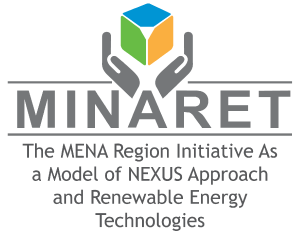NEXUS
The Water-Energy-Food Nexus is a useful concept to describe and address the complex and interrelated nature of our global resource systems, on which we depend to achieve different social, economic and environmental goals. In practical terms, it presents a conceptual approach to better understand and systematically analyze the interactions between the natural environment and human activities, and to work towards a more coordinated management and use of natural resources across sectors and scales. This can help us to identify and manage trade-offs and to build synergies through our responses, allowing for more integrated and cost-effective planning, decision-making, implementation, monitoring and evaluation (FAO, 2014).
Across the Water-Energy-Food nexus there are a number of critical challenges (nexus hotspot), each with their own focal point, scale and stakeholders, some focus on food security on a national scale, while others seek to address renewable energy deployment in a specific region, so it is a challenge to find a one-size-fits all model capable of capturing these resource interactions and trade-offs.
Water, energy, and food security are complex sectors on their own but they become even more complicated when their interactions begin to be studied. Rather than view the interrelatedness of the water, energy and food security sectors as a hindrance, their relationships should be used as an opportunity to tackle development issues with a multi-sectoral approach. The Water, Energy and Food Security (WEF) Nexus approach aims to understand how of each of these three sectors relates to the other two and how this understanding can be used to make policy decisions that promote sustainable development and poverty reduction (Bizikova, Roy, Swanson, Venema, & McCandless, 2013).
The connection between water, energy and food security may seem apparent in some cases, for example, agriculture is a main user of water and energy and water can be used as an energy source to power food production processes.In other cases, the link between the sectors may more discrete, for example, does an increase in the production of biofuels affect a country’s food security? (Bizikova, Roy, Swanson, Venema, & McCandless, 2013). Similarly, advances in one sector may lead to degradation of the others. The inefficient use of water for agriculture can lead to the over withdrawal of groundwater, which may lead to food insecurity in the future. The Nexus approach is more than technological advances; it requires collaboration across ministries, different levels of government and international cooperation. Reliable and effective governance is critical to the nexus approach. A crucial aspect of effective governance is the engagement of participatory approaches. Participatory approaches, including stakeholder involvement, and monitoring and evaluation of community responses, are critical to ensuring that the priorities of those affected by policies are being met.











